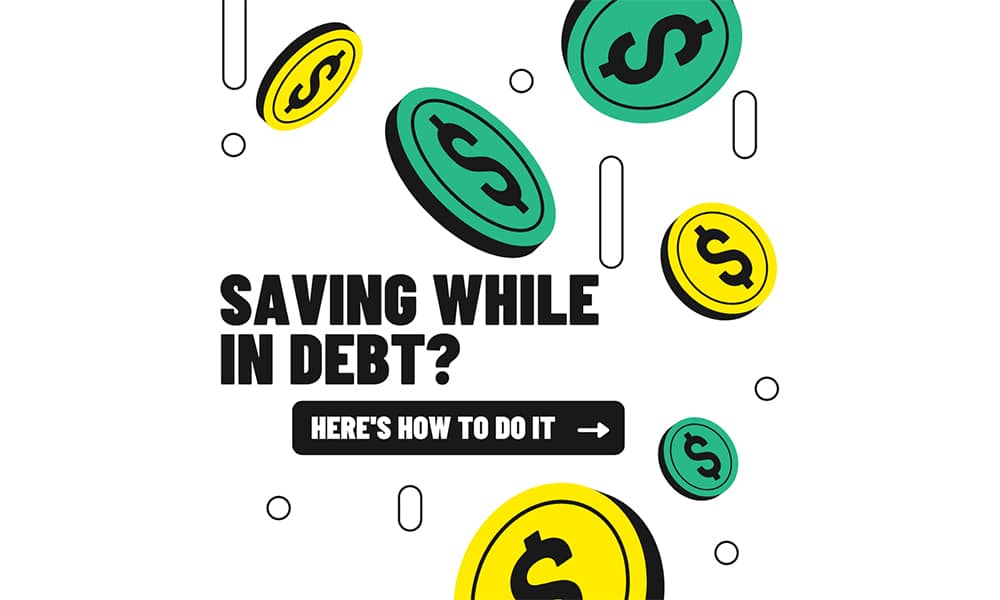
Saving While in Debt? Here’s How to Do It
Many ask themselves whether they should save money while repaying their debt. While this may seem counter-intuitive, the answer is a definitive yes.
Some of the main reasons for this are that it will help you develop good money habits, boost your long-term financial security, and give you a safety net to rely on if unexpected expenses or financial hardship arise.
Let’s dig into the most important steps you need to take when saving while in debt.
Create a Budget to Track Your Expenses
Creating a budget is crucial when managing your finances and aiming for specific financial goals, especially if you are trying to achieve multiple goals, such as paying off your debt and building savings.
The first step when creating a budget is listing all your costs and income sources. Your sources of income include any income you make from employment, investments, or other sources.
Your expenses should be divided using two different criteria. First, you should separate your needs from your wants. Needs are essential items that are required for your survival, such as rent, food, utilities, and transportation. Wants are non-essential expenses like vacations, new clothes, or online streaming services.
The second criterion is to separate fixed and variable expenses. Fixed expenses are the ones that remain constant every month, such as rent or loan payments, while variable expenses vary from month to month, such as groceries or entertainment. You should actively track your variable expenses to get an accurate estimate. You can do so using a budgeting app or by writing down all your expenses in an Excel spreadsheet.
Debt repayments can be added to your expense list as a separate category. Ensure you include all your debt obligations, such as your mortgage, student loan, credit card payments, etc.
Key Takeaway: Creating a budget and tracking expenses is essential when saving while in debt, as it helps you understand your financial situation. This allows you to better allocate money for both debt repayments and savings.
Identify Areas for Savings
Creating a budget will give you an initial idea of your expenses and where you can cut back. You will likely notice some areas you can reduce spending on, such as take-out meals, entertainment, and shopping.
When cutting expendable costs, you may decide whether to use this newly available income to pay debt faster or to start saving. The answer depends on many factors, such as how fast you want to get out of debt and how much savings you have already accumulated.
If you have been struggling to make minimum payments and haven’t set up an emergency fund yet, you should use the newly available income to reach these two goals as quickly as possible.
On the other hand, if your debt repayment is going well and you have already saved a few months of emergency funds, then you can decide more flexibly which percentage of the money you free by cutting costs should be used for debt repayment should be saved.
Key Takeaway: When creating a budget and cutting expenses, you should prioritize paying off your debt faster and setting up an emergency fund. Once these goals have been achieved, you can save more money with the extra income from cutting expenses.
Set Realistic Saving Goals
When you have decided to start saving while in debt, it is important that you set realistic goals. In the same way, you should not take on too much debt. You should also not overextend yourself when it comes to saving.
Your goals should be realistic and achievable with your current income and expenses. You can set small goals, such as saving a few hundred dollars each month for emergencies or longer-term savings, so you can slowly increase your savings rate over time.
Once you start achieving your goals, they will be easier to reach and more ambitious, such as saving enough money to buy a car or start your own business.
Having emergency savings while in debt will place you in a way better financial situation and help you reduce your reliance on debt in the future. Setting realistic goals and following through with them can be very rewarding, so make sure you take the time to plan and start saving.
Key Takeaway: When creating a budget and saving while in debt, it is important to set realistic goals to stay on track with your financial plan. Start by saving small and increase your savings rate over time. This will help you achieve your goals faster and be more prepared for financial emergencies.
Read More: Saving Money for a Goal
Pay Off Higher-Interest Rate Loans First
One common tactic when repaying your debt is to start by paying off the loans with the highest interest rates first (avalanche method).
For instance, if you have a loan with an interest rate of 6% and another one with 11%, then it makes more sense to start by paying the 11% interest loan first since it will save you more money in the long run.
However, if you are having difficulties making minimum payments on all your debts, then you may want to try the snowball method. This strategy focuses on repaying smaller loans first instead of focusing on interest rates. This approach can help you to stay motivated and gain momentum as you pay off one debt after the other.
Key Takeaway: When paying off debt, you should use the avalanche method to pay more interest on higher-interest-rate loans first. This will help you save money in the long run. If you need help making minimum payments on all your loans, then the snowball method may be more suitable for you since it focuses on repaying smaller loans first.
Look Into Consolidation Options to Reduce Interest Rates and Monthly Payments
Debt consolidation combines all your loans into one single loan, usually with a lower interest rate than the original ones.
This way, you can reduce your monthly payments and make it easier to stay on top of your debt repayments.
Debt consolidation can be done through a bank or loan consolidation company and through government-supported programs. You can also use debt consolidation to refinance your mortgage, student loan, credit card payments, and so on.
Level Personal Loan is also a great option for debt consolidation, as we offer competitive interest rates and flexible repayment terms. Take our short quiz, and you’ll receive a quote very quickly.
Key Takeaway: You can look into debt consolidation to combine all your loans into one and reduce the interest rates. This way, you can lower your monthly payments and make it easier to stay on top of your debt repayments.
Read More: Learn How to Get a Loan for Debt Consolidation
Evaluate Ways to Increase Your Income
Increasing your current income will make it easier to repay debt faster and build up your savings. You can adopt it to give a boost to your monthly income. Here are some of them.
- Negotiate a pay raise – Talk to your boss and explain why you deserve a raise.
- Find a second job – Find freelance jobs, part-time gigs, or a side business to generate extra income.
- Earn passive income – Explore ways of making money from investments, such as rental properties or dividend stocks.
Those listed are just some ideas on how to increase your income. Finding the right way to boost your earnings will depend on your skills, interests, and current situation.
As when cutting expenses, decide which percentage of the additional income you want to use for savings and which one you want to use to pay off debt based on your current needs and long-term goals.
Key Takeaway: To speed up your debt repayment, consider increasing your income. Decide which percentage of the additional income you want to use for savings and which one you will put towards debt repayment. Talk to your boss about a pay raise, find a second job, or make passive income through investments.
Read More: Top Passive Income Ideas







Sorry, the comment form is closed at this time.